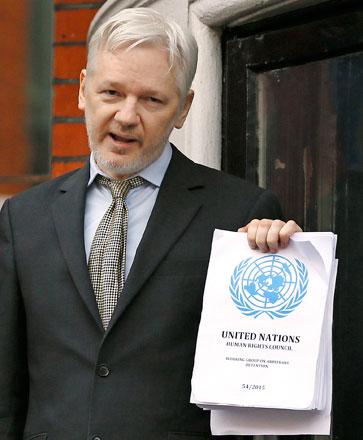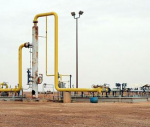You are here
Ecuador grants citizenship to WikiLeaks founder Assange — foreign minister
By AFP - Jan 11,2018 - Last updated at Jan 11,2018

Ecuadorean Foreign Minister Maria Fernanda Espinosa speaks during a press conference in Quito, onThursday, to announce WikiLeaks founder Julian Assange became an Ecuadoran citizen on December 12, 2017 (AFP photo)
QUITO — Ecuador has granted citizenship to WikiLeaks founder Julian Assange, who has been sheltering at its London embassy for five years to avoid arrest, Foreign Minister Maria Fernanda Espinosa announced on Thursday.
Espinosa told a press conference in Quito that Assange, a 46-year-old Australian, became an Ecuadoran citizen on December 12.
As a result, she said Ecuador had asked London to recognise Assange as a diplomat — which would give him safe passage out of the embassy without fear of arrest — but Britain had refused.
“The Ecuadoran government is empowered to grant nationality to the protected person and thus facilitate... his inclusion in the host state,” Espinosa told reporters.
She said the request to Britain to accept diplomatic status for Assange was made on December 20, and denied a day later.
The foreign minister said Quito would not insist further on the issue because of the “good relations we have with the United Kingdom”.
The British foreign ministry said in a statement that Ecuador had “recently requested diplomatic status for Mr. Assange here in the UK. The UK did not grant that request, nor are we in talks with Ecuador on this matter”.
Ecuador’s attempt to obtain diplomatic status for Assange comes as part of the country’s broader efforts to resolve the case of their long-term lodger, who moved into the embassy in 2012 to avoid arrest over a Swedish probe into rape allegations.
Sweden dropped their investigation over the 2010 allegations last year, but British police have said they are still seeking to arrest him for failing to surrender to a court after violating bail terms.
“Ecuador knows that the way to resolve this issue is for Julian Assange to leave the embassy to face justice,” Britain’s foreign ministry said on Thursday.
Assange has refused to step outside the embassy and claimed he fears being extradited to the United States, over WikiLeaks’ publication of leaked secret US military documents and diplomatic cables in 2010.
Espinosa had said on Tuesday her government was looking at the possibility of a “third country or a personality” stepping in to resolve the stand-off.
“No solution will be achieved without international cooperation and the cooperation of the United Kingdom, which has also shown interest in seeking a way out,” she said.
Related Articles
WikiLeaks founder Julian Assange, who has spent over two years in Ecuador's London embassy to avoid a sex crimes inquiry in Sweden, said on Monday he planned to leave the building "soon", but Britain signalled it would still arrest him if he tried.
LONDON — WikiLeaks founder Julian Assange Friday urged Britain and Sweden to let him walk free from Ecuador's embassy in London after a UN p
LONDON — WikiLeaks founder Julian Assange has tested positive for COVID, his wife said on Monday, as she battles his extradition to the Unit
















